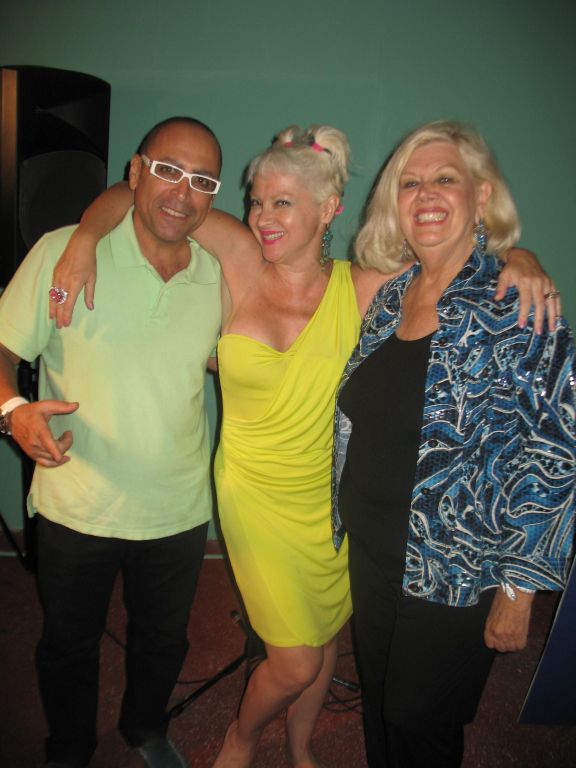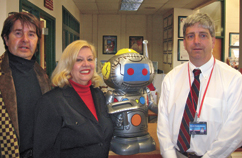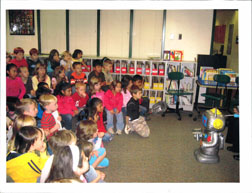AW Stories of the Month
An Interview with performer Frannie Sheridan and activist Marianne Malky
Comedian and Performer Frannie Sheridan
Tell us about your show…and how it’s evolved over time.
I found out that my show, “I Tried to be Normal…But it was Taken,” is specifically and unexpectedly resonant with children who have been abducted. I have a lot more of my personal story in my show now. The identity confusion in my family – being Jewish and raised Catholic — has many parallels into other areas. I’ve dealt with

coming out of the closet as a child of Holocaust survivors, which kind of like coming out of the gay closet, but not as much fun. When you come out as a child of Holocaust survivors, no one throws you a friggin’ parade! However, we could learn a lot from the gay community. The way they have a huge rainbow colored float with female impersonators dancing to Madonna, we could have a giant matzo-ball shaped float with fun Jews hammered on Manischevitz shaking their latkes! On a serious note … A lot of people who are the children of Holocaust survivors seem to have parallels in their lives to the abducted kids. My show now offers more interculturally-relatable content. A big part of my father’s story was feeling that he had to hide our identity (as Jews). So I know hat it feels like to grow up “in hiding.”
How did you and Marianne Malky meet?
We initially met at a networking meeting in Lake Worth. Then she came to see my show at Harold’s. By the way, the new space for performing is open and is swishier, larger with a sexy Italian coffee maker, right across the street at Harold’s Coffee Lounge. We are really having fun – there are a lot of truly unexpected parallels in our work. I’ve added more content now (to my show) to do with being a child of survivors. It’s a very timely topic – to find the healing in growing up as a child of survivors. I’ve spent the past 17 years doing dramatic solo shows about my family and I had this internal voice telling me to add more humor. My family’s craziness is a big topic for the show – I’ve been told that it’s Richard Lewis-esque with a dash of Lucille Ball because I do some character act outs and have this elastic face. I’m always very aware of the neuroses in ourselves and other people. I can’t escape the craziness that I grew up with in my family. By doing comedy, it’s a chance to make fun of the other side of ourselves.
In part of my show, I talk about pets. After giving up on having a dog, a cat and a parrot (because of all of my issues), I settled on a plant. Naturally I chose a standard Wandering Jew. Well, it turns out to be a masochistic plant. I tried saying sweet things to it, and it wilted. But if I criticized it and said things like, “How can you live with yourself – you farkukta plant?” – it thrived on that and started to grow again. It thrived on abuse.
What “spoke to you” about Marianne’s organization Voice for the Children?
Immediately I felt blown away by Marianne’s courage. She shared that her child was abducted by her ex-husband while she was in the hospital, and that she never got her son back. She will never know her grandchildren. Subconsciously, it really moved me and I related to it. In their efforts to protect us, my parents split up the family in two. My “little girl part of me” was taken away early – and it seems like it’s taken forever to get it back. Marianne is a bubble of joy. Instead of becoming a bitter, resentful person, she is a light. She created this organization to help other people who go through what she went through. It’s fabulous! As for me, I’m not being in the closet about my issues – I’m trying to find a relatable way to tell my story too.
Why do you think it’s important to do non-profit and awareness type work – as a performer?
Anything I can do to give back and spread a little joy is extremely

rewarding. “And in the end, the love you take is equal to the love you make,” as the Beatles song goes. Although my performances are not pro bono, I have a very reasonable fundraising rate and am thrilled to have helped raise significant funds for quite a few organizations. I was also intrigued and excited by the fact that she does detective work. She’s a true powerhouse.
Tell us about the details of this show, happening on April 23rd.
Marianne will begin with a short presentation, and she’ll introduce her robot that she uses to talk with young kids about abduction, (as sponsored by Burger King in one of her recent trips). Then I will do my show, “I Tried to Be Normal…But it was Taken.” This will be followed by a Q&A session with the audience. This is a fundraiser for Voice for the Children. A few restaurants have given away some raffle prizes for the audience too. The show is sold out. It will take place on April 23rd at 2pm at the Boynton Beach Senior Center, 1021 S. Federal Highway, Boynton Beach, FL.
What are the future plans for taking this show on the road?
My show continues to run every 2nd and 4th Saturday night each month when I am in town at Harold’s in West Palm Beach. We want to continue doing this collaborative show together too. I’m currently re-writing my screen play. I want to make my story as interculturally relatable as possible while funneling in humor. It has the potential to touch so many communities. The more that we can laugh at the crazy parts of ourselves, the more we don’t pass it on. We have pending bookings right now and plan to take it to the big cities.
Anything else??
See the website FrannieSheridan.com for show times for “I Tried to be Normal but it was Taken” – at Harold’s. Please note that it does include some sexual content, but I consider it clever – as opposed to vulgar.
Activist Marianne Malky
What is your goal with your organization Voice for the Children, Inc? When did you found it? Why?
I founded it in 1990, although I started doing this work in 1974. I’ve become a legend in this field. I founded the organization mainly to give children a voice, children who have been parentally abducted. We aim to educate children, so that if they are abducted – they’ll understand what’s going on. It’s amazing that Frannie Sheridan and I met and found so many parallels.
You were abducted as a teenager. Tell us about that experience. How did you escape?
I was abducted at 17 years old by a stranger – a rapist in Long Branch, New Jersey. He grabbed me from behind and pulled me into a car. He took me to the woods and he was beating me up. I pretended to be unconscious. Luckily I think fast – I get an adrenaline rush. I saw headlights coming up the road. I decided if I threw myself in front of the car, I would either be saved by that person or hit by the car. It worked and she saved me. They never caught the guy. They showed me some mug shots at the police station. I didn’t recognize any of the people’s mug shots that they showed me. I couldn’t believe the way they treated me at the police station. They kept telling me, “I bet you knew him.” It was at that moment that I decided I was going to do something. I didn’t know what it would be, but I knew I was going to take action.
Your son was abducted at age 7 by your ex-husband. Tell us about the struggle to get him back. How long did it take?
In 1974, I was in the hospital. My ex-husband called me at the hospital and said, “I’m taking your son. You’re never going to see him again.” And he did. So I put a picture of my ex-husband with a “wanted” sign on the website. His real name is Steven Shipenberg. However, he changed his name to Steven Sanders. And he changed my son’s name to David Sanders. This is, by the way, the biggest problem in finding the kids who have been abducted – the name change. I went in person to many homes, knocking on doors. Many years later, I knocked on the right door. His wife answered the door. “I’m his real mother,” I told her. They closed the door and didn’t want anything to do with me. I visited the police station in Alexandria, VA. I tried to show my son that I had been looking for him for years. I produced a documentary video to show him that I was looking for him. I sent the video over there (to his house) with a process server – but he kicked it into the street.
I have a daughter Desiree Malky who is a Senior Producer for Channel 25 News. I am very proud of her. She has won many awards for her work. Of course, alienation from one’s own child never is easy. But it does help the healing process to have a good relationship with another child. Desiree is a blessing.
Parental alienation is the topic I’ll be talking about at the Toby Center in Boynton Beach, on Wed. April 25th from noon to 2pm. April 25th is National Parental Alienation Day, a good day to educate about this issue.
Also, I will be appearing in a movie called “Bill at Lawless America.com” – a video that compiles the voices of everyone who was not helped by the courts in these situations.
People think just because you have custody, you are safe. But my ex-husband had been arrested twice and I had custody. And this happened.
What are the different ways you are getting the word out about abduction?
I have a TV show. I have a website – Voice for the Children. I have the robot that comes with me to different affairs. The robot teaches about parental abduction and stranger abduction – he sings a rap song about abduction. It works well with the young kids and helps them to open up on this topic.
We went to North Carolina with the robot, and the trip was sponsored

by Burger King. Jerry Ames, who’s active in Voice for the Children, helped to set it up.
We have a case in Wellington, by the way. The child was abducted to Peru. Michael Bergeron is the father, and his wife took the child to Peru. These things are usually pre-meditated. The daughter is six now; she was abducted in 2009. Michael got a welfare check, which means a social worker goes to check the house and the living conditions. In many cases, there’s evidence of sexual abuse or physical abuse. This case is no exception. But sadly – it’s very complicated and costly to bring a child back to this country, after they have been abducted to another country. Very seldom do the children ever come back. The laws of the country the child has been abducted to now apply to the child, instead of our laws in the United States.
How can parents teach their children about “stranger danger?” What do you recommend?
 One of the main things is – when you’re walking down the street, make sure you’re walking facing the traffic. In my case, the guy jumped out behind me and pulled me into the car. I feel like it couldn’t have happened if I had been facing the traffic.
One of the main things is – when you’re walking down the street, make sure you’re walking facing the traffic. In my case, the guy jumped out behind me and pulled me into the car. I feel like it couldn’t have happened if I had been facing the traffic.
Look around – don’t be oblivious to what’s going on. Look to see who is watching you. Just walking back and forth to school is the main window of time when children are abducted. When the guy abducted me, he told me, “I’ve been following you for 3 days.” They might be studying your routine.
Walk with a friend. Always use the buddy system.
How did you meet Frannie and how did you decide to join forces for this show in Boynton Beach at a Senior Center?
We met at a networking meeting and then I went to see Frannie’s comedy show. Here’s what I love about Frannie’s personality – she’s always excited about everything. And that’s how I am. We get along great!
People ask why I’m so positive. I have to always be positive because I counsel people who want to kill themselves. I need to be.
Frannie’s childhood has a lot of parallels to the stories of abduction that I am telling. “When someone is abducted or in hiding, they are not allowed to reach out to the family they had before. It’s the same thing with parental abduction. They cry a lot. They are taught to fear the other parent. They might tell the child, “If they see you, they’re going to kill you.” You can’t be yourself. They tell them “we’re protecting you from this other person” because they’re going to kill you. It’s such a heavy load to remember all these secrets. These children feel they did something wrong – that’s why the other parent left. Their identity is taken away by changing the name. Often they do not want to go back to their real name (because they feel like they will lose their identity again). They are very uncomfortable in their own skin with all these burdens. It’s often like a dark cloud is over their heads. In a parental abduction case, the child is torn between two parents. In Frannie’s case, it was the same family, but she was torn between wanting to go back to Judaism and not wanting to.
Frannie, who is so versatile and talented, manages to find humor in her challenging experiences. She says she would like to be called, “Frannie the Jew.” While it might seem funny, she feels that she’s getting back her identity by saying that.
For more information about performer Frannie Sheridan and upcoming show dates, visit FrannieSheridan.com. For more information about Marianne Malky and A Voice for the Children, visit AVoicefortheChildren.org. Where can you find Robbie The Safety Robot – for educating young children about “stranger danger” and other issues? Please contact us at 561-586-8515 if you would like to schedule an appearance of Robbie the Safety Robot at a Parenting, Educational, or Information event that you are planning.

